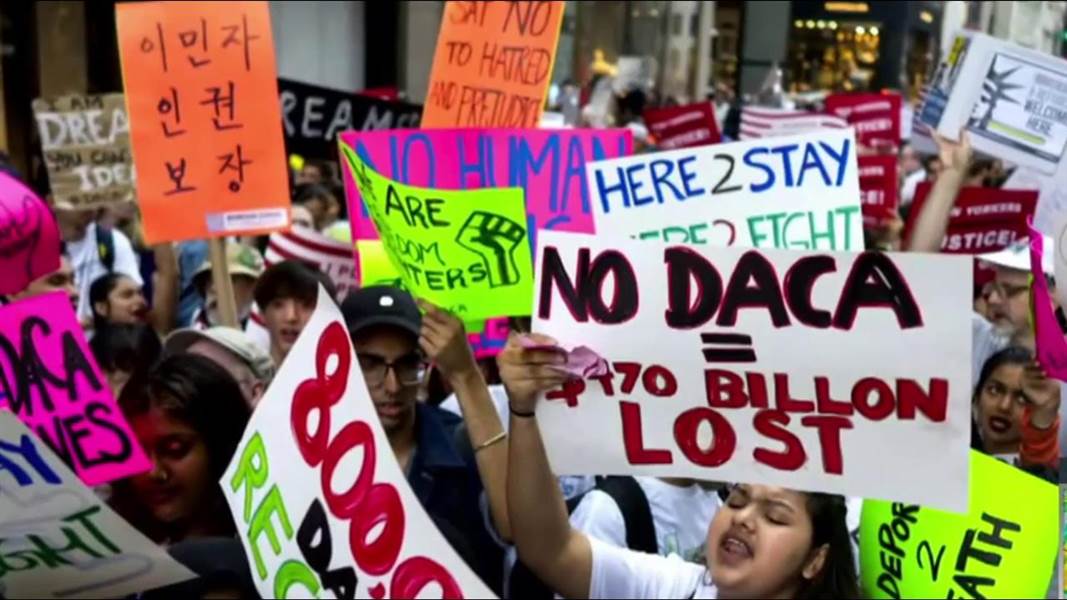Is This the End of DACA?
September 25, 2017
Among the hundreds of millions of patriotic citizens that are proud to call America their home and refuge, there are nearly eight hundred thousand ecstatic, hopeful and equally patriotic youth, that are also proud to call America home. The only difference? They’re undocumented.
George Washington, one of America’s founding fathers, said this about immigration; “The bosom of America is open to receive not only the Opulent and respected Stranger, but the oppressed and persecuted of all Nations and Religions; whom we shall welcome to a participation of all our rights and privileges…”
In June of 2012, Barack Obama instituted a new immigration policy, known as DACA, or Deferred Action for Childhood Arrivals. Said policy affects illegal immigrants who were brought to the U.S as children, and had been largely raised in America. The policy itself allows for these youth immigrants to apply for a two-year, renewable permit to work and attend school on American soil, without the possibility of deportation. The privilege was given to them based on the fact that the majority of DACA recipients are students, well-behaved, and functioning citizens of the U.S.
Since it’s passing in 2012, nearly 800,000 students and laborers have benefited from the policy, and they’ve since been labeled as DREAMers, after the Development, Relief, and Education for Alien Minors act, that failed to pass prior to the DACA.
On September 5th, this year, President Donald Trump announced that he and his administration will be “winding down” and eventually ending the DACA, but he is giving congress six months to come up with an alternative, and tweeted that “For all of those (DACA) that are concerned about your status during the 6 month period, you have nothing to worry about — No action!”
If ended, this decision would ultimately strip the DREAMers from their permits to work and get an education, and put them up for the chance of deportation once again.
The main argument made by President Trump, his administration, and critics of the program, is that those protected by DACA are unfairly receiving jobs that can be given to legal American citizens, and that if these immigrants wanted to seek refuge or work in America, they should have come here legally.
Jeff Sessions, attorney general, remarked that the program had “denied jobs to hundreds of thousands of Americans by allowing those same illegal aliens to take those jobs.”
Sessions’ claim can be refuted however, as there has been no specific evidence of an increase in unemployment after the proposition of DACA passed, in fact, data produced by the Bureau of Labor Statistics shows that unemployment has decreased since 2012.
Another critical viewpoint suggests that the DACA endangers the laws of immigration, and that less and less people will be coming to the U.S legally because of the program. However, a study done by the Journal on Migration and Human Security shows that in 2012, there were 11.1 million illegal immigrants in America, in 2013, there were 11 million, and in 2014, 10.9.
Despite all of the logical and critical concerns about the program, one needs to pay attention to how the DACA is a benefit to America and the economy.
If the program is canceled, nearly 30,000 DACA recipients would lose their jobs a month, as their status expires. And according to the Center of American Progress, “the loss of all DACA workers would reduce U.S. gross domestic product by $433 billion over the next 10 years.”
This decrease in the Gross Domestic Product would affect states over time, with California losing about $11.3 billion, Texas losing about $6.1 billion, and North Carolina $1.9 billion.
Since Trump announced his decision, giving congress a chance to come up with an alternative, the legislative branch has been hard at work, trying to come to a compromise with Trump on the matter.
Oklahoma Senator James Lankford reported, “The legislative and executive branch should put aside passivity and partisanship and finally modernize our immigration laws, it is right for there to be consequences for those who intentionally entered this country illegally. However, we as Americans do not hold children legally accountable for the actions of their parents.”
What will happen to DACA within the next critical months can not be accurately predicted, but what we do know is that a change will occur, whether that be coming up with an alternative for it, or scrapping it completely.
https://data.bls.gov/timeseries/LNS14000000
https://www.justice.gov/opa/speech/attorney-general-sessions-delivers-remarks-daca
